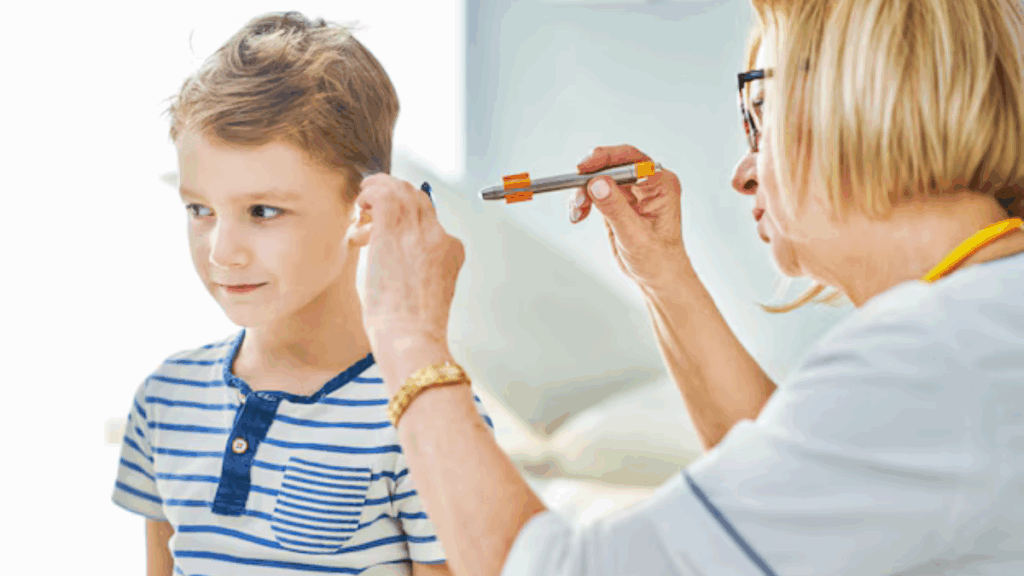
Hearing Tests for Kids: A Simple Guide for Parents
Hearing helps in speech, learning processes, as well as development of the brain in children. A child with hearing difficulties differentiating particular sounds, could find it hard to learn in class or even while communicating with others. This is why a hearing test for children is very necessary, thus having to be done often during the child’s formative years.
It is important to have hearing tests for your child early to identify difficulties that may hinder him/ her from learning. Here, you will understand when and how the tests are performed and what comes after the tests.
Why Are Hearing Tests Important for Kids?
Hearing is the primary way your child learns to speak, listen, and understand the world around them. If there is a problem with hearing, your child may:
- Learn to speak later than most
- Speak unclearly
- Have trouble with attention or following instructions
- Have difficulty with school or friends.
Read more: Hearing loss in children – If you want to know how hearing loss can affect your child’s learning and social development.
Typical Indications Your Child May Need a Hearing Exam
Here are a few of the indications that would make you suspect your child might be having hearing difficulties:
- Doesn’t respond when you call their name
- Puts the TV or mobile device on too high a volume
- Speaks either very loudly or very quietly
- Says, “What?” Come again? or repeatedly asks you to repeat yourself
- Is slower than other children in learning speech
If any of these turn up, it might be a great idea to go ahead and have a test scheduled.
How Often Should Kids Get Their Hearing Tested?
In regular intervals, as your child matures, hearing tests are critical. Age and health will relate to the timing of the test.
- For hearing testing purposes, newborn screening should be done before leaving the hospital.
- Infants (0 – 3 years old) are considered individuals at risk if any of the potentially noncontributing factors are related to health at birth, which may necessitate repeated hearing tests.
- Preschool and school-age children should be tested once every 1-2 years.
At any sign of hearing disruption, you should have them tested right away.
Types of Hearing Tests for Kids
The test varies with the child’s age and specification to respond to stimuli differently by the hearing specialists for infants, toddlers, and older children.
For Newborns
- OAE (Otoacoustic Emissions): A tiny earphone gives off sounds and then picks up the ear’s response.
- ABR (Auditory Brainstem Response): Measures how the auditory nerve tends to respond to sound when the baby is asleep.
For the Toddlers
- Visual Reinforcement Audiometry (VRA): The child turns toward a sound to be rewarded by a visual toy.
- Conditioned Play Audiometry (CPA): On hearing a sound, the child plays the game where they drop a block in a bucket.
For the Older Children
- Tympanometry: Assesses middle ear fluid or pressure.
- Conventional audiometry: When a sound is heard, the child raises a hand or presses a button.
If you would like to try easy methods to check your baby’s hearing before going to a clinic, also read: How to test baby hearing at home.
Age-Based Hearing Test Methods
Age Group | Recommended Test Type |
0–6 months | OAE, ABR |
6 months – 2 years | VRA, Tympanometry |
2–5 years | CPA, Tympanometry |
5+ years | Conventional Audiometry, Tympanometry |
How to Get Your Kid Ready for a Hearing Exam
A hearing evaluation is non-invasive and painless. But your child may be apprehensive. Here are some pointers to assist you:
- Explain the evaluation in a calm and friendly manner
- Make it easy for the child to understand that there are no needles or pain involved
- Bring a toy or snack to comfort your child
- Go to a clinic where the staff are known to relate well to children
Where to Get a Hearing Test
You can have your child’s hearing evaluated at:
- Government hospitals with ENT or audiology departments
- Private hearing clinics with pediatric audiologists
- Children’s hospitals with audiology departments
- Schools, or community health centres (for basic screening )
If you’re located near Delhi and you are looking for expert assistance, there are trusted hearing care clinics in Delhi that offer safe, accurate, and age-appropriate hearing tests. These clinics have dedicated audiologists trained to make children comfortable and engaged during the tests and have access to the latest technology.
What Happens After the Test?
If the results are normal:
- Your child should continue to have regular appointments.
- There is no action to take unless there are new concerns.
If your child’s test results indicate hearing loss:
- The audiologist should go over the results with you
- You may be suggested to consider hearing aids, therapy, or further assessment
- Being proactive means greater growth and learning opportunities for your child.
Conclusion
Children’s hearing tests are safe, painless, and a very useful information tool. Intervention can be put in place to prevent the problem from being ignored or worsening over time. This can help the child immensely with how they listen and communicate, learn, and play.
As soon as you would like to take your child for a test, do not delay. Parents should look to reputable clinics and be proactive in knowing their child’s hearing status. If you’re looking for a reliable hearing test in Delhi, choose a certified centre with pediatric experience to be confident that your child will be properly tested and maximally thought of as a person!
Frequently Asked Questions
Most newborns have their hearing evaluated before they leave the hospital; however, you can have your child’s hearing evaluated at any age if you are aware of symptoms that make you concerned about their hearing.
No, the hearing test is quick, painless, and safe.
You can do some simple checks at home, but only a proper evaluation with an audiologist will produce valid results.
An evaluation usually lasts between 15 to 30 minutes, depending on the child and the types of evaluations needed.
The audiologists who work with children know how to handle a child who won’t sit still for testing. Try scheduling the test after a nap or snack.
Dr. Harshi, is an accomplished Audiologist with extensive expertise in treating individuals with hearing impairments.

